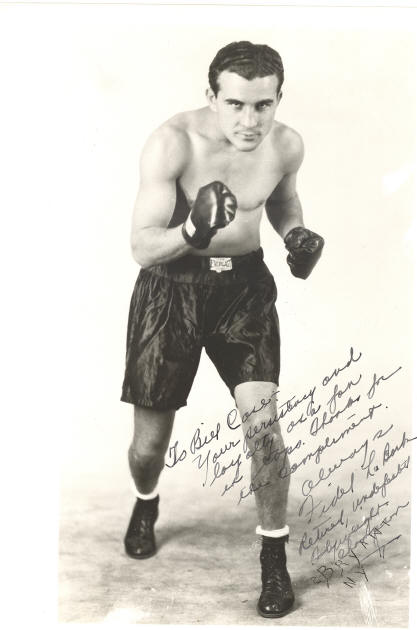- Fidel LaBarba
Infobox Boxer
name=Fidel LaBarba
weight=Flyweight
nationality= flagicon|USA American
realname=Fidel La Barba
birth_date=September 29 ,1905
birth_place=New York City, New York
death_date=death date and age|1981|10|2|1905|9|29|mf=y
death_place=Los Angeles ,California
style=Orthodox
total=94
wins=72
KO=15
losses=15
draws=7
no contests=0|Fidel LaBarba (
September 29 ,1905 –October 3 ,1981 ) was aUnited States boxer andsportswriter . He was born inNew York City , but grew up inLos Angeles, California . As a boy he sold newspapers and learned to fight on street corners. LaBarba was discovered at age 14 by manager George Blake who embarked him on an amateur career. As an amateur he won theflyweight division at the national Amateur Athletic Union tournament in Boston and he qualified for the United States Olympic team.Amateur career
LaBarba began boxing around age 12 or 13 in little amateur cards held weekly at places such as the Elks Club, which were promoted by Carlo Curtiss, who had been one of World Heavyweight Champion
Jess Willard 's managers. "Sometimes we would have nude women at these events," he said. The first known mention of “Young Fidel" is September 18, 1920, by theLos Angeles Times , announcing a boxing/wrestling show at the Italian picnic the next day atSelig Zoo . Eventually, Central Junior High School boxing instructor Bob Howard saw his potential. According to an interview published January 28, 1927 in some United States newspapers, LaBarba mentioned that he defeated a boy named Dave Mariney (a.k.a. Marini) for the high school championship. Based upon this win, his friends suggested he join the amateurs, which he did. By this, he likely meant he joined the A.A.U. Fidel found it ironic that his first “official" amateur opponent was none other than Dave Mariney. This was at a semi-monthly boxing show sponsored by the Los Angeles Athletic Club (L.A.A.C). “It looked like a crime to match the two," reported the Los Angeles Times November 4, 1920. LaBarba was about four feet tall, and his opponent a foot and a half taller. “But LaBarba soon showed he knew how to take care of himself."George Blake reportedly was the referee at that fight. He and Charles Keppen ran these L.A.A.C. shows. Blake had come to Los Angeles from Chicago in 1904. He had been a United States Army boxing instructor during World War I. By the early 1920s, Blake was a well-known referee for boxing venues such as Jack Doyle's Vernon Arena, and would become the regular referee at the soon-to-be-built Hollywood Legion Stadium. He was much-respected and known as a man of impeccable character. Blake took an interest in the young and talented Fidel LaBarba, and asked Bob Howard to have him come down to the club. " I was asked four or five times, but was embarrassed to go," LaBarba explained. He owned only one pair of torn tennis shoes. He finally mustered the fortitude to go see Blake; thus started a very long relationship. LaBarba continued to have many amateur bouts. "We would receive a gift worth $35.00," he noted. “Later, they would give us a gift certificate to buy clothes at places like the Broadway, or Sears."
Meanwhile, LaBarba attended Central Jr. High School, and then Lincoln High School--both in Los Angeles. He enjoyed playing basketball, baseball, and especially football. He was the quarterback for the “lightweight" (midget) football team. While in high school, he sometimes worked nights until midnight, racking pins at a bowling alley, then sleeping on a cot in back of the building. In the morning he would grab a bite to eat at the local restaurant, then head off to school about a mile away.
By 1924, LaBarba had lost only one bout after some 30-plus recorded contests. George Blake took eight of his L.A.A.C. boxers to Boston June 1924 for the Olympic trials, and LaBarba qualified. LaBarba won the gold medal in the flyweight division at the
1924 Summer Olympics inParis . After the Games, Blake arranged an amateur card at Doyle’s Vernon Arena with all the American Olympic fighters, at which LaBarba finished out his amateur career.Olympic Results
*Jul 15, 1924
E. Warwick (England) @Velodrome d'Hiver , Paris, France W-3 (First Round)
*Jul 16, 1924Gaetano Lanzi (Italy) @ Velodrome d’Hiver, Paris, France TKO-2 (Second Round)
*Jul 18, 1924 Rennis/Rennie (Canada) @ Velodrome d’Hiver, Paris, France W-3 (Quarter-Final Round)
*Jul 19?, 1924Rinaldo Castellenghi @ Velodrome d’Hiver, Paris, France W-3 (Semi-Final Round)
*Jul 20, 1924James McKenzie (G.B.) @ Velodrome d’Hiver, Paris, France W-3 (Final)Pro career
Although still in high school, LaBarba turned professional that same year.
On
August 22 ,1925 , LaBarba defeatedFrankie Genaro in a convincing 10 round decision to win the American Flyweight title. In 1927, he won the world flyweight championship fromElky Clark . La Barba dominated the fight, knocked Clark down five times and won all twelve rounds.Seven months later, LaBarba retired to enter
Stanford University . Less than a year later, however, he returned to the ring as afeatherweight . He won his first five fights, and in 1931 split two decisions withKid Chocolate . OnMay 22 ,1931 , he was given an opportunity to win the world featherweight title, but was out pointed byBattling Battalino .LaBarba’s career was prematurely curtailed when he suffered a detached retina in training for a fight against Kid Chocolate for the New York featherweight title. On
December 9 ,1932 , LaBarba not only lost the fight in a close decision, but went blind in his eye. After the fight, he underwent surgery to repair the tear, but it was unsuccessful and he eventually had to have the eye removed.Later life
In 1933, he was forced to retire, and returned to Stanford, where he earned a degree in journalism. After graduating from Stanford he worked as a sportswriter, and later worked in public relations, as a screenwriter, and as a technical advisor in Hollywood for boxing movies.
Fidel LaBarba died in Los Angeles, California, in 1981. He was inducted into the
International Boxing Hall of Fame in 1996.External links
*
Wikimedia Foundation. 2010.
